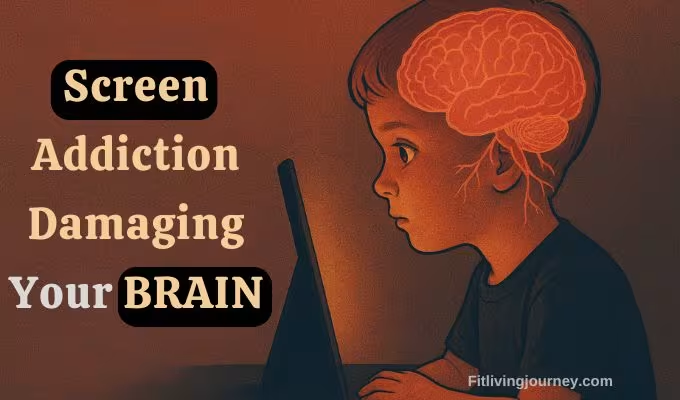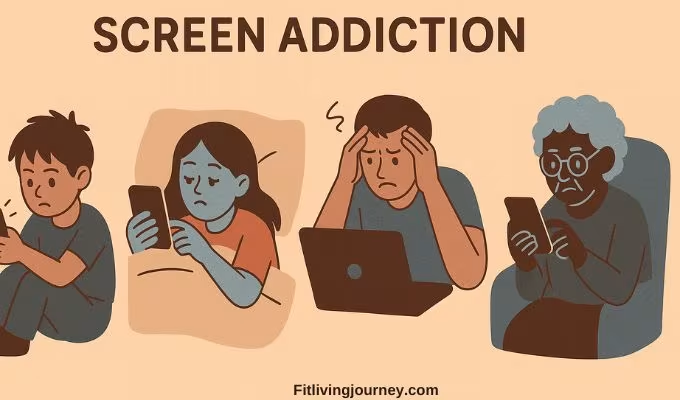Screen addiction
Earlier, childhood was full of wonder games, friends, joy, and imagination.
Children were encouraged to climb trees, play with soil, watch stars, ask questions, and explore life with all their senses.
The Shift Toward Screens
But today, many children’s eyes are fixed on just one thing—screens. Be it a tablet, mobile phone, television, or console.
Some studies say that 42% of children under 12 spend 2–4 hours daily on smartphones or tablets.
And as they grow older, screen time increases.
What Really Happens in the Brain?
A young child’s brain is like soft clay—shaped by repeated exposure.
When a child spends many hours a day on screens, their brain is flooded with dopamine, the reward chemical.
It feels good, but only temporarily. Slowly, the brain starts craving more dopamine.
This leads to more screen time to get that same reward.
The Cycle of Restlessness and Dependency
Eventually, the brain becomes restless, distracted, and even anxious without its dopamine dose.
This cycle begins silently and can have serious consequences.
Physical Effects of Excessive Screen Time
Too much screen time can hurt a child’s physical development:
- It may lead to obesity
- Increases intake of junk food
- Decreases consumption of fresh fruits and vegetables
- Reduces sleep and physical activity
- Causes eye strain—with symptoms like dry eyes, headaches, and blurry vision
Mental and Emotional Impact
The deeper damage touches mental health :
- Focus, memory, concentration, and cognitive skills weaken
- Studies show more than 2 hours of screen time causes thinning of brain cortex
- Thinking and language skills lower
- Watching violent, unsupervised content leads to aggression and rudeness
- Children may stop realizing their mistakes by mimicking what they see
Social Isolation and Emotional Disconnect
Too much screen time reduces time spent with family and friends, which can worsen emotional development and social skills.
What Can Be Done? A Message of Awareness
This isn’t a message of fear, but of awareness. You can take simple yet powerful steps to protect your child’s mind and heart.
- Lead by Example
Start with yourself. If your child sees you glued to the phone, no advice will matter. Lead by example.
- Introduce Screen-Free Hours
Set aside time during meals, mornings, and evenings when all screens are turned off for everyone. Make this a daily ritual.
- Encourage Boredom
Let them feel bored. From boredom comes creativity. From silence, ideas are born.
- Spend Time with Them
Tell them stories—from scriptures, history, or your life. Play games. Talk freely. Spend real time.
- Reconnect with Nature
Take a walk in the park, walk barefoot on grass, or sit quietly under a tree.
This heals more than we understand.
- Connection Over Content
Yes, screens are everywhere. They can be tools for learning, discovering, and entertainment—but they can’t replace the warmth of your presence or the safety of your arms.
Your child needs connection, not just content.
[ 14 Day Silence Challenge Will Transform Your Mind ]
- Build the Right Foundation
They don’t just need a window to the world—they need a foundation to stand on. That foundation is human connection.
Take this opportunity. Be their safe space, storyteller, coach, and friend.
Leave a Lasting Memory
Years from now, they won’t remember the videos.
They’ll remember the values, the moments, and the time you were there.
Be that memory. Be the guide.
🔎 FAQs on Screen Addiction and Children
Q1. How many hours of screen time is safe for a child under 12?
Most studies recommend limiting screen time to less than 2 hours per day for children under 12.
Q2. What are the main signs of screen addiction in kids?
Look for restlessness, anxiety, reduced focus, and less interest in physical or social activities.
Q3. Can screen time really affect brain development?
Yes, excessive screen exposure can lead to cognitive delays and thinning of the brain cortex.
Q4. What are the physical side effects of screen overuse?
They include eye strain, obesity, poor sleep, and junk food cravings.
Q5. What’s the most effective way to reduce screen time?
Parental involvement setting rituals like screen-free hours and spending quality time makes a big difference.


